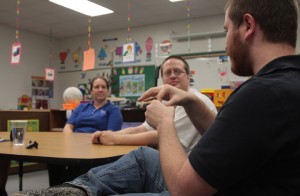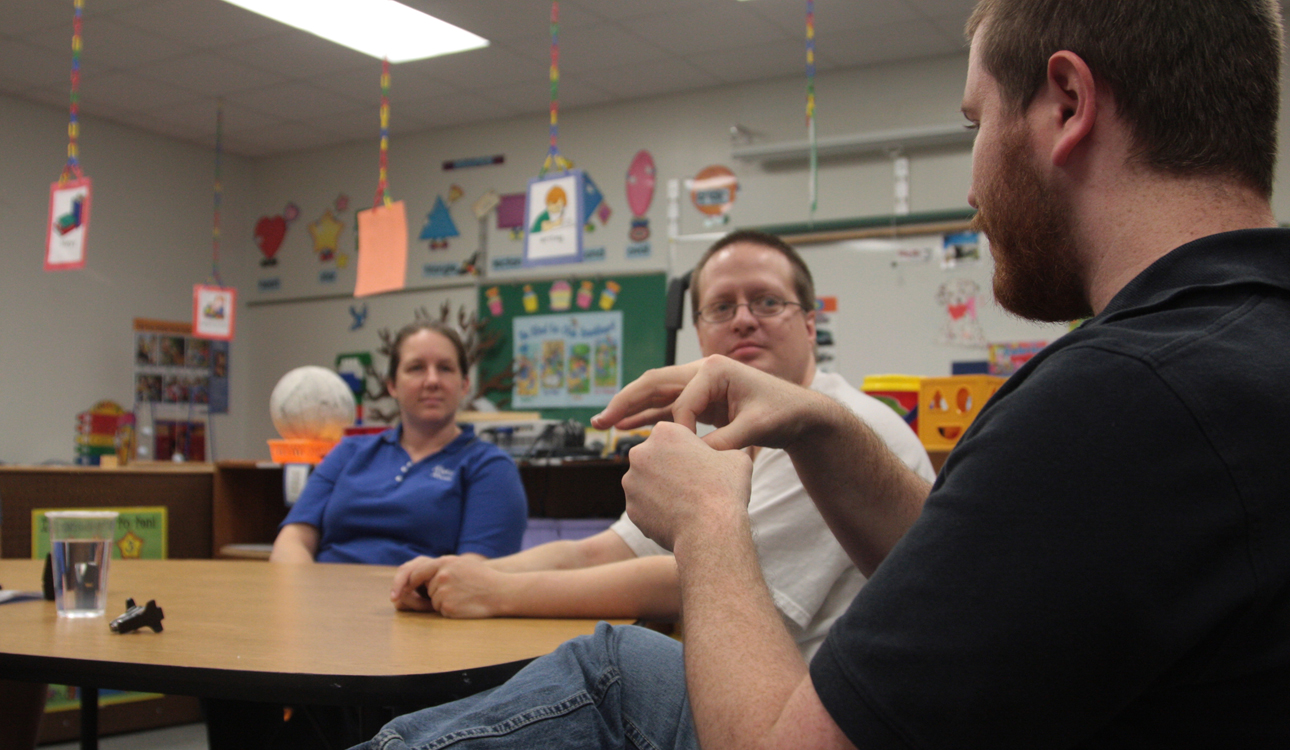Editor’s note: This is the final part of a three-part series on issues in the deaf community.
Read “Baylor sign language policy sparks class credit debate”.
Read “Museum urged to accommodate deaf”.

A group of deaf students meets in Waco.
By Sara Tirrito
Staff Writer
Despite Waco’s cultural diversity, gaining equality remains a challenge for some groups that live here. Even today, there is disparity in the treatment of the hearing community and the deaf community, often stemming from misunderstanding or ignorance.
Allen Arrington, an interpreter in the office of Access and Learning Accommodations at Texas State Technical College, said the hearing community often views the deaf as broken or as if they are missing something from their lives, such as being able to hear music or the birds outside. But the deaf see their situation differently, he said.
“They don’t feel like they’re missing anything,” Arrington said. “That’s part of who they are and they’re proud of that. For deaf, their language is visual; their world is visual. They look at the world through different eyes.”
China Spring junior Joey Bartlett, a member of the deaf community, said some who are deaf do see themselves as disabled, but others don’t.
“Those who don’t consider themselves as disabled are still called a minority; but they would prefer to be labeled as a linguistic minority, rather than a disabled minority,” Bartlett said. “Disability often gives the wrong impression that they are unable to function normally. But say, a hearing person with no knowledge of ASL walks into a room full of deaf people, who then is the linguistic minority in the room?”
Someday, Bartlett said, he hopes the hearing community will realize the deaf are not abnormal or mentally or physically handicapped.
“I want people to see us not as unfortunate, but as a perfectly functioning human being,” Bartlett said. “It is my deepest wish that ignorance about the deaf community and its culture will be completely obliterated by educating people everywhere that we are capable of anything and everything, and that God made us all according to plan.”
Ignorance in the hearing community about the deaf culture and community can be a problem because of a lack of familiarity with and exposure to the deaf community, Arrington said. Although Waco does in some ways lack accessibility to the deaf community, Arrington said he thinks the city is at about the same level of accessibility as other cities with deaf populations of a similar size.
Still, the lack of accessibility can cause frustrations in certain situations, such as when interpreters are not provided during doctor’s appointments or aren’t made available at work meetings.
Tension can also be sparked when workers at fast food restaurants or retail stores don’t know how to react to a deaf customer.
“Some workers or people know what to do when they know you are deaf and get a pen and paper ready for you, while others just stand there and look at you and don’t know what to do,” Tazz Speasmaker, a TSTC senior, said. “Some people get frustrated because they can’t communicate with deaf people and think it’s a waste of time, and we are trying to get the same service as everyone else does. Just because we can’t hear, it doesn’t mean we don’t know how to communicate with people and I wish more businesses would be more accessible to deaf people.”
Even trying to go to the movies poses frustrations to deaf movie-goers in Waco, where neither the Starplex Galaxy 16 nor the Hollywood Jewel 16 currently have closed captioning. Here, members of the deaf community can’t keep up with new releases because they have to wait until they can get a DVD with closed captioning. Plus, the movie-going experience is lost, Bartlett said.
“What difference does it make, watching a movie in the theater and watching a movie in the comfort of your own home?” Bartlett said. “The difference varies among people, but for me, it’s the ambience of the movie theater — the bass rumbling in my chest from the surround sound and the flashes of light on the screen — that makes us feel we are actually in the movie. “At home, we’re sitting on the couch and we can enjoy the movie, but the experience just isn’t the same.”
Waco does have some accommodations for the deaf community, however.
The Waco Civic Theatre recently included volunteer interpreters in their production of “A Christmas Story,” and there are also some churches in the area that provide interpreters at their services.
Columbus Avenue Baptist Church in Waco is believed to have the oldest deaf ministry in the state, Rob Granberry, deaf ministry coordinator, said. The church offers an interpreted service at 11 a.m. on Sunday and a Bible study class led by a teacher who is deaf.
“Usually more people show up to that than for the worship service because there’s always something missing in translation,” Granberry said. “Some deaf people feel like music and the other activities in the worship service don’t pertain to them so much, so they prefer the Bible study because it’s all in sign language.”
Members of the deaf community have also worked to put together a slate of events that keep them in contact with one another and give them chances to socialize.
“In deaf culture, one of the key concepts is community and fellowship,” Arrington said. “Every chance deaf get to get together, they get together and talk.”
Speasmaker is the host of two such events, ASL Social and the Waco & Temple Deaf Coffee Chat, and the president of Deaf Night Out.
Although Waco may become more accessible in the future, Bartlett said the size of the deaf community and the money needed to make changes might be obstacles to that progress.
“I do believe Waco can become more accessible to the deaf, but I don’t expect it to become fully accessible,” Bartlett said. “We are a minority. We have a small group of deaf who are interested in doing things like watching a movie or going to a museum. Often, it is questioned whether the money spent on the accommodations would be well worth it. … I hope someday I can enjoy a lot of things I am unable to enjoy today.”
Arrington said other challenges that need to be overcome include discrimination in the work force and in education.
“There’s still a lot of work to do as far as catching up and, in the community, being viewed as equal,” Arrington said.




